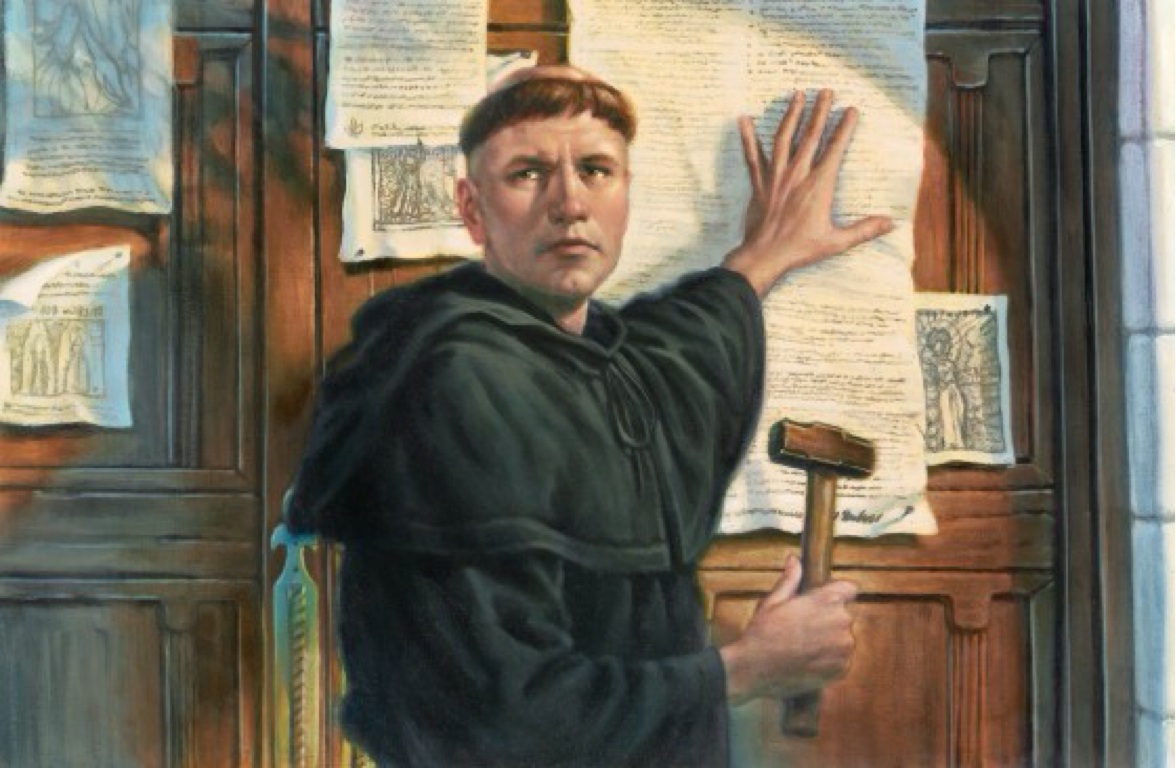
This week’s devotions are based on the Week 7 “Explore God” – Can I Know God Personally? (WATCH HERE)
Open for debate.
506 years ago today in Wittenberg, Germany a catholic monk named Martin Luther sparked a debate in the church and among people about the core tenets of Christianity. At the heart of the question he challenged was, “How does one have a personal relationship with God?”
In the Catholic Church of Luther’s day, the answer to this question was that the only way a person could get right with God was by a pattern of life that was filled with acts of penance (paying something for your sins), trips to “holy” places on pilgrimages, or the paying of money for indulgences (pieces of paper that were signed by the pope declaring sins forgiven).
Martin Luther struggled mightily inside his heart and outside in his environment of the monastery to find peace with God. He would deprive his body of its needs; agonize in prayer and yelling at the devil; and meticulously carrying out the duties of a monk. Yet, even though he was following the path laid out by the church to find peace with God, he had no peace.
One of the unique privileges Luther had as a monk and also being asked to be a professor of theology at the University of Wittenberg and so had access to a Bible. Access to the Bible was a big deal because the average person would have to rely on what the priest taught about the Bible but never had access or ability to read it for themselves.
As Luther struggled to find peace with his relationship with God, he knew God knew him personally but saw him as a righteous judge who could and would punish him for all his sins. Terror filled his heart until he discovered this truth in Romans 1:16-17:
16 For I am not ashamed of the gospel, because it is the power of God that brings salvation to everyone who believes: first to the Jew, then to the Gentile. 17 For in the gospel the righteousness of God is revealed—a righteousness that is by faith from first to last, just as it is written: “The righteous will live by faith.”
In the reading of this Scripture the reality came to heart for Luther that the righteousness that God demanded was not to be found in the works of man, but in the works of Christ. Trusting the work of Christ is yours give the certainty and the peace that salvation, eternal life in heaven is yours.
When God’s Spirit solidified this truth in Luther’s heart, he went from doubt and fear about his relationship with God to one of peace and hope. When the focus shifted from his performance to the perfection of Jesus, his conscience finally found the rest it had.
But Luther was not settled with this truth just for himself.
He saw how the hearts and consciences of individuals all around him and under the teaching of the Catholic Church were being tormented by fear. People were afraid of the punishment of God and so they were being convinced to buy indulgences that were guarantees from the church that their sins would be forgiven. Not only were they encouraged to buy them for themselves, but for their loved ones who they were taught were languishing in purgatory until enough forgiveness could be earned or bought to free them. People were spending the little money they had to fill the coffers of the church based on a false teaching that forgiveness could be earned or bought.
Luther could not stand by idle.
So he wrote 95 statements or Theses regarding the sale of indulgences and posted them to the door of the Castle Church in Wittenberg Germany to begin a debate and what he hoped would be the return of the church back to the clear teaching of salvation and forgiveness by grace through faith in Jesus. The day he did this was October 31, 1517 on “All Hallow’s Eve” or All Saints Eve. He knew that people would come to church on November 1 for the celebration of All Saints Day, so he ensured the issues for debate were made available for all to see.
October 31 is recognized in the Lutheran Church as Reformation Day. On this day, the debate was started, but instead of the Catholic Church returning to the truth of the Bible, they dug in their heels and the Lutheran Church was born standing on the clear truth that our relationship with God is secured FOR us by the perfect life, innocent death, and glorious resurrection of Jesus Christ. It’s in the grace of God that we are secure in our relationship with God.
Apply: What changes for you when your relationship with God is based on Christ’s performance for you rather than your performance for God?
Prayer: Lord, thank you for the truth of your word and the message of salvation by grace alone. Thank you for faithful and bold servants of yours to always teach and rely on the truth of your holy Word to bring the comfort, joy and peace of your grace to the hearts of people. AMEN.
